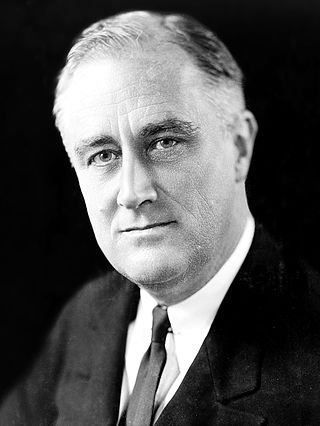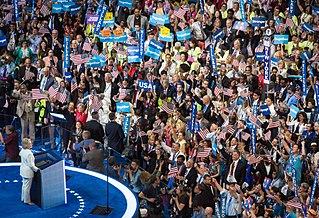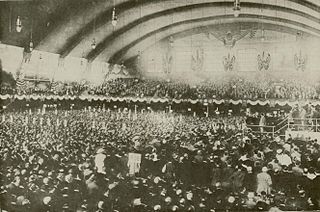
The 1836 United States presidential election was the 13th quadrennial presidential election, held from Thursday, November 3 to Wednesday, December 7, 1836. In the third consecutive election victory for the Democratic Party, incumbent Vice President Martin Van Buren defeated four candidates fielded by the nascent Whig Party.

The 1860 United States presidential election was the 19th quadrennial presidential election, held on Tuesday, November 6, 1860. In a four-way contest, the Republican Party ticket of Abraham Lincoln and Hannibal Hamlin won a national popular plurality, a popular majority in the North where states already had abolished slavery, and a national electoral majority comprising only Northern electoral votes. Lincoln's election thus served as the main catalyst of the states that would become the Confederacy seceding from the Union. This marked the first time that a Republican was elected president. It was also the first presidential election in which both major party candidates were registered in the same home state; the others have been in 1904, 1920, 1940, 1944, and 2016.

The 1932 United States presidential election was the 37th quadrennial presidential election, held on Tuesday, November 8, 1932. The election took place against the backdrop of the Great Depression. The incumbent Republican President Herbert Hoover was defeated in a landslide by Democrat Franklin D. Roosevelt, the governor of New York and the vice presidential nominee of the 1920 presidential election. Roosevelt was the first Democrat in 80 years to simultaneously win an outright majority of the electoral college and popular vote, a feat last accomplished by Franklin Pierce in 1852, as well as the first Democrat in 56 years to win a majority of the popular vote, which was last done by Samuel J. Tilden in 1876. Roosevelt was the last sitting governor to be elected president until Bill Clinton in 1992. Hoover became the first incumbent president to lose an election to another term since William Howard Taft in 1912, and the last to do so until Gerald Ford lost 44 years later. The election marked the effective end of the Fourth Party System, which had been dominated by Republicans. It was the first time since 1916 that a Democrat was elected president.

The Democratic National Convention (DNC) is a series of presidential nominating conventions held every four years since 1832 by the United States Democratic Party. They have been administered by the Democratic National Committee since the 1852 national convention. The primary goal of the Democratic National Convention is to officially nominate a candidate for president and vice president, adopt a comprehensive party platform, and unify the party. Pledged delegates from all fifty U.S. states, the District of Columbia, and the American territories, and superdelegates which are unpledged delegates representing the Democratic establishment, attend the convention and cast their votes to choose the party's presidential candidate. Like the Republican National Convention, the Democratic National Convention marks the formal end of the primary election period and the start of the general election season. Since the 1980s, national conventions have become mostly inaugural events for the winning candidate, since winners are announced long before the convention. In 2020, both major parties, and many minor parties, replaced their usual in-person conventions with virtual programs due to the COVID-19 pandemic.

The 1976 Republican National Convention was a United States political convention of the Republican Party that met from August 16 to August 19, 1976, to select the party's nominees for president and vice president. Held in Kemper Arena in Kansas City, Missouri, the convention nominated President Gerald Ford for a full term, but only after narrowly defeating a strong challenge from former California Governor Ronald Reagan. The convention also nominated Senator Bob Dole from Kansas for vice president, instead of Vice President Nelson Rockefeller, who did not seek nomination for a full term. The keynote address was delivered by Tennessee Senator Howard Baker. Other notable speakers included Minnesota Representative Al Quie, retired Lieutenant Colonel and former Vietnam prisoner of war Raymond Schrump, former Democratic Texas Governor John Connally, Providence, Rhode Island mayor Vincent Cianci and Michigan Senator Robert P. Griffin. It is the last national convention by either of the two major parties to feature a seriously contested nomination between candidates.

The 1860 Democratic National Conventions were a series of presidential nominating conventions held to nominate the Democratic Party's candidates for president and vice president in the 1860 election.
The 1868 Democratic National Convention was held at the Tammany Hall headquarters building in New York City between July 4, and July 9, 1868. The first Democratic convention after the conclusion of the American Civil War, the convention was notable for the return of Democratic Party politicians from the Southern United States.
The Constitution Party National Convention is held by the United States Constitution Party every two to four years. As of April 2024, there have been nine.
A brokered convention, in US politics, can occur during a presidential election when a political party fails to choose a nominee on the first round of delegate voting at the party's nominating convention.

The 1912 Democratic National Convention was held at the Fifth Regiment Armory off North Howard Street in Baltimore from June 25 to July 2, 1912.
The 1848 Democratic National Convention was a presidential nominating convention that met from Monday May 22 to Friday May 26 in Baltimore, Maryland. It was held to nominate the Democratic Party's candidates for President and Vice president in the 1848 election. The convention selected Senator Lewis Cass of Michigan for President and former Representative William O. Butler of Kentucky for Vice President.

Voters of the Republican Party elected state delegations to the 2012 Republican National Convention in presidential primaries. The national convention then selected its nominee to run for President of the United States in the 2012 presidential election. There were 2,286 delegates chosen, and a candidate needed to accumulate 1,144 delegate votes at the convention to win the nomination. The caucuses allocated delegates to the respective state delegations to the national convention, but the actual election of the delegates were, many times, at a later date. Delegates were elected in different ways that vary from state to state. They could be elected at local conventions, selected from slates submitted by the candidates, selected at committee meetings, or elected directly at the caucuses and primaries.

From January 3 to June 5, 2012, voters of the Democratic Party chose its nominee for president in the 2012 United States presidential election. President Barack Obama won the Democratic Party nomination by securing more than the required 2,383 delegates on April 3, 2012, after a series of primary elections and caucuses. He was formally nominated by the 2012 Democratic National Convention on September 5, 2012, in Charlotte, North Carolina.

During the 2012 presidential primaries, 51 individuals sought the nomination of the Democratic Party. Incumbent President Barack Obama won the nomination unanimously at the 2012 Democratic National Convention and was re-elected as president in the general election by defeating Republican nominee Mitt Romney. As expected for the incumbent president, Obama won every primary election, but faced more difficulty than projected. Fifteen additional candidates appeared on primary ballots, and of these, four appeared on more than one ballot. Four qualified for convention delegates including: attorney John Wolfe, Jr., prison inmate Keith Russell Judd, perennial candidate Jim Rogers, and anti-abortion activist Randall Terry. Each of these had their delegates stripped prior to the convention due to technicalities.

The 2000 Libertarian National Convention was held in Anaheim, California, from June 30 to July 4, 2000. Harry Browne was again chosen as the party's presidential nominee, becoming the first Libertarian Party candidate to be nominated twice for president.

The 2020 Green Party presidential primaries were a series of primary elections, caucuses and state conventions in which voters elected delegates to represent a candidate for the Green Party's nominee for President of the United States at the 2020 Green National Convention. The primaries, were held in numerous U.S. states on various dates from early spring into early summer of 2020, and featured elections publicly funded, concurrent with the Democratic Party and Republican Party primaries, and elections privately funded by the Green Party, held non-concurrently with the major party primaries.

The 2020 Libertarian National Convention delegates selected the Libertarian Party nominees for president and vice president in the 2020 United States presidential election. Primaries were held, but were preferential in nature and did not determine delegate allocation. The convention was originally scheduled to be held from May 21 to May 25 at the JW Marriott Austin luxury hotel in downtown Austin, Texas. On April 26, all reservations at the JW Marriott Austin were canceled in response to the COVID-19 pandemic, leaving the convention oversight committee to seek another venue for a possible July date.

The 2020 Green National Convention (GNC) or presidential nominating convention was an event in which delegates of the Green Party of the United States (GPUS) chose its nominees for president and vice president in the 2020 U.S. presidential election. The convention was originally scheduled to be held July 9–12, 2020, at Wayne State University in Detroit, Michigan, but it was decided to instead hold the convention online due to the COVID-19 pandemic.

The 2020 Constitution Party presidential primaries were a series of primary elections determining the allocation of delegates in the selection of the Constitution Party's presidential nominee in the 2020 United States presidential election. On May 2, 2020, the Constitution Party nominated Don Blankenship for president and William Mohr for vice-president. Several state parties split from the national Constitution Party to nominate their own candidates.
This article lists third party and independent candidates, also jointly known as minor candidates, associated with the 2024 United States presidential election.
















